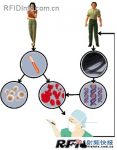
US law enforcement agencies use RFID to track DNA samples
[ad_1]
Currently, DNA samples are becoming an increasingly important method of helping federal and state law enforcement agencies resolve crimes and convictions. Evidence from DNA samples can also be used to eliminate false convictions. However, Wisconsin and Illinois have recently discovered that electronic records of DNA have significant sample size gaps, with the actual number of records in the records being less than the number of criminals on file. In both states, all criminals must have an electronic DNA sample in the database. These gaps appear to be due to clerical errors and slow test processing, but the actual errors appear to be due to insufficient or non-collected samples, but the actual source of the gaps is difficult to pinpoint due to lack of traceability. And RFID technology provides an effective solution to improve the records kept in the database, improve the conviction rate and improve the safety of the public.

The federal government and 47 states currently have DNA samples from criminals. These samples are compared against crime scene evidence to identify potential suspects from DNA sample comparisons. There are currently about 7 million samples in the FBI database, and the New York Times said it expects to add about 80,000 samples each year. The Times reports that as the legislation expands the population of DNA samples to be collected, in addition to convicted criminals, all arrested and unconvicted suspects are also being collected, which will increase to 1.2 million per year by 2012 samples, as common as fingerprinting. Nineteen states have passed legislation requiring DNA samples from arrested suspects, and another 15 are considering legislation to do the same. Some experts have suggested that the capacity of the database will be increased to 24 million samples.
DNA samples, collected via oral swabs, were previously collected by prison officials and more recently by police departments. The samples are sent to a central laboratory to establish DNA records and then electronically entered into a state or federal database. Today, there is no way to track the location of these samples to determine if or where a sample was lost, or to confirm whether a sample was collected. In addition, there is a backlog of DNA sample analysis that further complicates the process by building an inventory with limited visibility. The FBI alone has a backlog of 290,000 samples.
Wisconsin found that 9 percent of the total sample, or 12,000 criminals, had no DNA samples recorded in the database. Illinois estimates that about 50,000 criminals have no records of DNA samples, or 17 percent of the total sample. We suspect that many other states have similar disparities. Wisconsin learned that some DNA samples had been missed because it stumbled across a murder suspect who had no DNA samples on file, however finding and re-collecting those missed samples would take years and would be labor-intensive , material and financial resources, all aspects of pressure.
RFID provides a method to ensure traceability of sample collection and custody. Today, the authorities admit that they have little visibility into the tracking of the samples, so they cannot determine what is wrong, is the sample not taken, lost, the sample is being tested, or the data was entered incorrectly? This tracking system, which can identify samples at the item level, provides quick visibility into misplaced and missing samples and helps local police departments accurately collect samples. While systems can be encoded with 2D barcodes, the automated nature of RFID will enable faster, more reliable processing and provide accurate location information. In addition, we believe that RFID is particularly suitable for tracking and locating the backlog of individual samples in criminal laboratories. By prioritizing the identification of samples of convicted offenders (relative to non-convicted offenders), it will help to improve the processing of the backlog. Such efficiencies will not only improve DNA databases, but may also reduce the cost of manual searches and enable faster investigations.
RFID also provides a chain of traceability for crime scene evidence custody, including DNA samples.
[ad_2]



